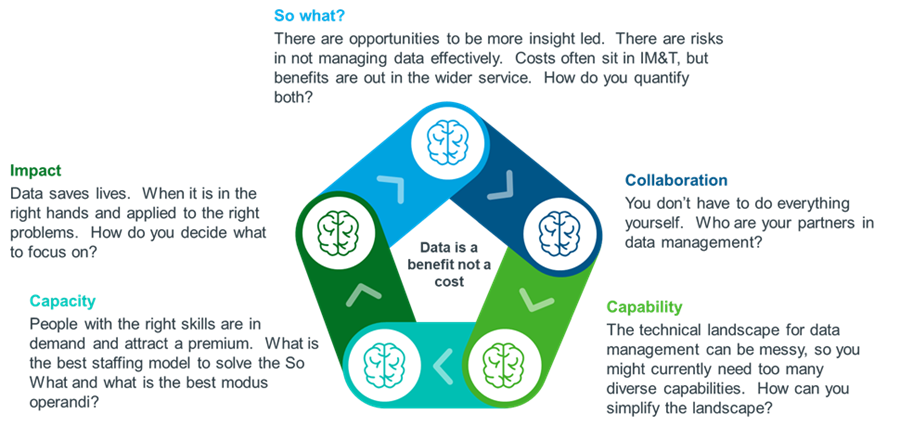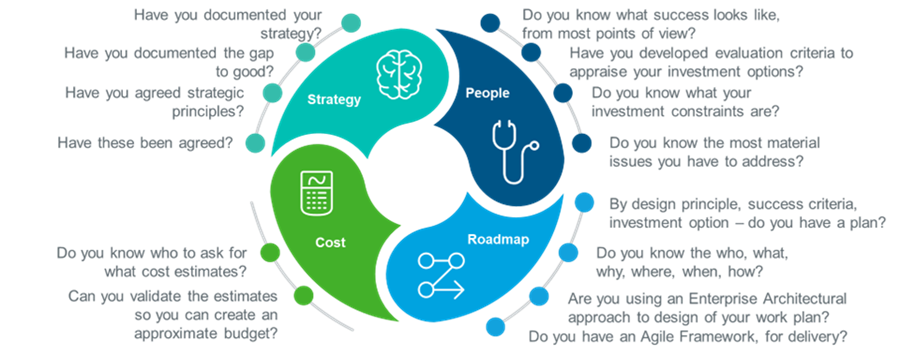Fueling transformation to increase value and improve patient outcomes




- Locations
- United Kingdom
- Building an effective Data Management roadmap for your organisation
We have witnessed significant change in the health and care data landscape in recent years. This is due to a range of service re-design initiatives, new advances in technology and changes in investments in data management capability. As a result, many NHS Trusts are now reviewing their approach to data management, to ensure their data strategy is more equipped for the 21st century. In this blog, Paul Henderson, Director of Consulting, UKI Healthcare, IQVIA discusses some of the issues to consider turning strategy into action.
Innovations such as Artificial Intelligence and the rise of data science and machine learning are transforming the world of research and slowly making their impact on service delivery. Initiatives such as Shared Care Records, Secure Data Environments and the Federated Data Platform are providing an opportunity to consider how organisations can use their data effectively to save lives at scale. However, some Trusts struggle to manage their core business with clunky data warehouses, staff shortages and sub-optimal investment. Some Trusts find understanding the power of data challenging and struggle to see how to get the benefits from managing data more effectively.
Many Trusts utilise a data strategy and have a set a number of principles, within data security and privacy, Interoperability and Integration, Data Quality and Standards, Ethics, and Innovation and Technology. Many strategy documents, despite being very helpful, are very similar and are given to teams to turn into plans – and that is where there are challenges. Here are 5 questions to consider if this challenge has landed on your doorstep.

Making a case for “data” is counter-intuitive, in the same way as we did not make a business case for oxygen when we woke up this morning. Both data and oxygen are similarly necessary in order to save lives. However, much of the discussion about the cost of the data relates to the cost of software and hardware, rather than the cost of building a hospital in the wrong place, providing an inadequate service or treatment and having the wrong staffing model. All these things have an impact on financial, services and on patients that is greater than the cost of managing data and providing analysis and insight.
Equally, investment is being used into data management platforms that require stand-alone strategies, which assumes a Trust must do everything itself and are bound to put forward an inflated view of the cost of data management. This can provide Trusts with uncertainty and extent of the scope for collaboration with partners.
Much of the national work, for example, led by NHS England includes standardising on fewer, modern technologies simplifying the data management landscape therefore potentially making it easier for Trusts to access valuable insights, integrate data sets and make systems more interoperable. The intention is to do this in a cost-effective way that helps solve the challenge of resourcing data work, It is challenging because data folks attract a salary premium as there aren’t enough of them.
So, you have reflected on the 5 questions to consider when managing your data efficiently. What do you do next? Dig more deeply into the 4 key components to structure a data management roadmap:
- Strategy: Ensure your strategy and strategic principles are agreed by all relevant stakeholders
- People: Confirm the governance arrangements, key priorities, and delegate responsibilities with sufficient detail
- Roadmap: Be clear on weaving organisational priorities and the delivery framework into your strategy
- Cost: Ensure the importance of constantly validating the business case for the roadmap cannot be over-stated.
Below are some helpful questions to consider when shaping a data management roadmap:

At IQVIA, our dedicated experts can help you to set your data management strategy and have the expertise to create your roadmap to deliver the change you need. Contact us for more information: NHSSolutions@iqvia.com

